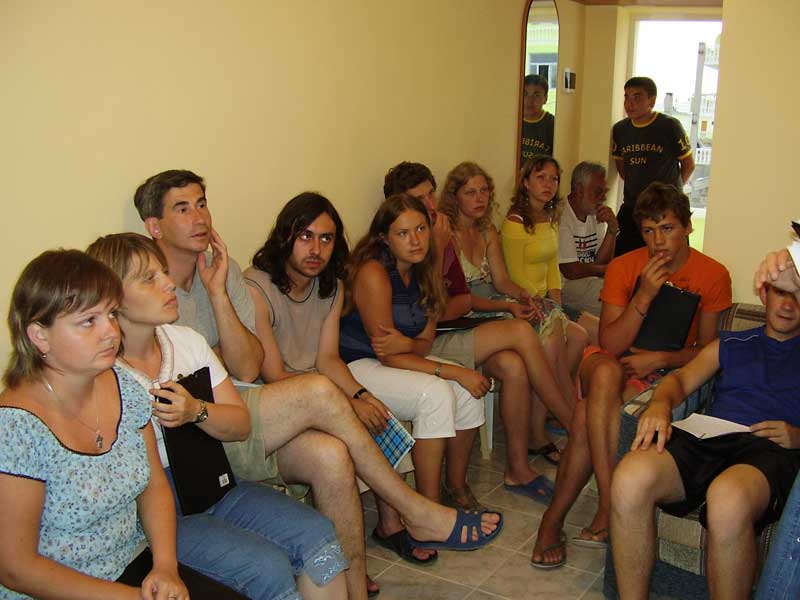Living History of the Testimonies All-Ukrainian Field Summer School on Holocaust Studies took place in the Crimea
 The participants of the all-Ukrainian Field Summer School “The Holocaust through the Eyes of the non-Jewish Population (Russians, Ukrainians, Crimean Tatars) on the Example of the Crimean Peninsula” attempted at recreation of the tragic pictures of the WWII in the Crimea basing on the witness’ statements. Field research by the associates of the Crimean Ethnographic Museum, university students, and senior high school students was done at August 4-12th, 2006 in Krasnogvardeyskiy region (former Kurman-Kemeltchinskiy) and Razdolnoye village (former Ak-Sheikh), where before the War lived a large Jewish population and existed Jewish national kolkhozes.
The participants of the all-Ukrainian Field Summer School “The Holocaust through the Eyes of the non-Jewish Population (Russians, Ukrainians, Crimean Tatars) on the Example of the Crimean Peninsula” attempted at recreation of the tragic pictures of the WWII in the Crimea basing on the witness’ statements. Field research by the associates of the Crimean Ethnographic Museum, university students, and senior high school students was done at August 4-12th, 2006 in Krasnogvardeyskiy region (former Kurman-Kemeltchinskiy) and Razdolnoye village (former Ak-Sheikh), where before the War lived a large Jewish population and existed Jewish national kolkhozes.
The Summer school was organised by Ukrainian Centre for Holocaust Studies (director Anatoly Podolsky). The author and manager of the project is Tatyana Velichko, postgraduate student of the Institute for Arts, Folklore, and Ethnology of NAS of Ukraine. “Unfortunately, there are few protagonists of Oral history method in Ukraine, that is why our Summer school became an important stage in qualifying specialists for the future work in the field. Usual history methods only when combined with oral history can give the general picture. – notes Tatyana Velichko. – because Jewish kolkhozes and neigbouring areas had polyethnic surrounding: Russians, Ukrainians, Crimean Tatars, Germans etc. – we were especially interested in their perception of the Holocaust and inter-ethnic relations of the pre-war period”.
Stories of the local dwellers-witnesses to those events made it possible to find one more place of execution of Jews in times of WWII in Bashennya str in Razdolnoye village. The place is now occupied by water tower. Besides the statements about the tragedy of Jews, participants gathered information about another great tragedy – deportation of the Crimean Tatars in May 1944; and even some information about deportation of Crimean Germans.
Publication of the collection of the gathered data is planned.
Announcements
MoreLatest News
-
Bulletin «Lessons of the Holocaust», № 4 (84), 2025
Dear colleagues! The fresh issue of information-pedagogical bulletin of UCHS «Lessons of the Holocaust», № 4 (84), October-December, 2025 has been published.
[More] -
(No) Children’s Stories Exhibition in Odesa
Starting the year with a powerful event - from January 19 to 30, 2026, Odesa will host the exhibition (No) Children’s Stories for the first time.
[More] -
Bibliographic Database “Jewish Studies in Independent Ukraine”
The Ukrainian Association for Jewish Studies has begun work on a project to create a bibliographic database entitled Jewish Studies in Independent Ukraine. The project envisages the creation of a reference resource covering various types of academic publications, as well as dissertations and educational publications
[More] -
Happy New Year 2026 from the Ukrainian Center for Holocaust Studies!
2025 was a year of action and partnerships. With our team and partners, we made many meaningful initiatives possible.
[More] -
The Formation of Holocaust Scholarly Discourse in European Nations
On December 16, 2025, the State Institution Institute of World History of the National Academy of Sciences of Ukraine held the International Scientific Conference The Formation of Holocaust Scholarly Discourse in European Nations.
[More]




